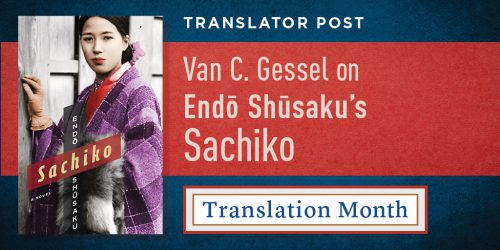Househunting in the Homeland — Part 2 of an essay by Wendy Law-Yone, author of "A Daughter's Memoir of Burma"
“It struck me for the first time how stable, how fixed was the life of a dictator…. He was the immovable, centrifugal force that had sent thousands of Burmese citizens spinning out into the troposphere of permanent displacement.”—Wendy Law-Yone
The following essay is by Wendy Law-Yone, author of A Daughter’s Memoir of Burma. This is the second part of her essay (read part one here) looking back at her return to Burma after years of exile:
The young reporters were watching us drive up and down the road at snail speed, peering at the house numbers from the open windows of our taxi. As we approached once more the high wall in front of which they were gathered, I asked the taxi driver to stop.
They crossed the road toward us in a pack: four women and two men in their twenties and thirties, cameras and press ID’s swinging from their necks, a boom microphone leading the way.
“What are you looking for, Auntie?” The sassy girl with the ponytail leaned in through his window to address me.
“House number Fourteen A,” I said. ‘We can’t seem to find it.’ I got out of the car to stretch my legs, and was immediately surrounded.
“Hello, Auntie! Where are you from, Auntie?”
“From this very street. I used to live here. At Number 14 A.”
“When, Auntie?”
“Long before any of you was born.”
“And Auntie now lives in – ?”
“London.”
“London!” Ah’s! and Aw!’s of wonderment. I might have mentioned the moon.
“But tell me,” I said. “What are you all doing here, anyway?”
“Waiting for the prisoner release,” said the girl with the ponytail brightly. Then, seeing my blank look, “Auntie does know about the prisoner release?”
Auntie did know. Only Auntie had been distracted and forgotten the big news: Six hundred political prisoners were to be released that day—yet another earnest of the government’s dedication to reform.
“General Ne Win’s grandsons are coming home any minute!” one of the boys blurted out. “That’s why we’re waiting here, in front of their house.” I stared at the house with the high wall across the street, slow to take in the revelation.
In 2001, the year before his death, Ne Win had fallen foul of the ruling military clique and been placed under arrest together with the daughter with whom he was living. The following year, the daughter’s husband and three sons were imprisoned on charges of plotting a coup.
Ne Win died in 2002; his daughter was released from house arrest in 2006, but his grandsons had remained in prison. It was they who were about to be released.
“You mean,” I said, “they still live here?”
It struck me for the first time how stable, how fixed was the life of a dictator. Since assuming power in 1962, Ne Win had lived on this street, and died on this street, exactly where, as a fifteen-year-old, I had last set eyes on him. He was the immovable, centrifugal force that had sent thousands of Burmese citizens spinning out into the troposphere of permanent displacement.
“Can you tell us some memories of your childhood, Auntie?” one of the reporters was asking.
“I’ll tell you a story,” I said. “Once upon a time there was a family that waited, just as you are waiting today, for a prisoner to be released. The prisoner was my father. And the man who imprisoned him was the same man whose grandsons you’re expecting any minute.”
Out came the notebooks and tape recorders. “His name, Auntie?”
“Whose name?”
“Your father’s?”
“U Law-Yone,” I said. “Editor of The Nation. A newspaper long before your time.”
Did anyone even remember The Nation, I had wondered over the years. Or had every trace of its existence been expunged?
‘We know The Nation!’ crowed one of the young men. “A famous newspaper! Yes! I have heard of “Nation” U Law-Yone. And your name please, Auntie?’
I was spelling out my name for them when I noticed that John had positioned himself behind the group and was vigorously shaking his head to advise caution. “And that,” I added, motioning toward him, “is my husband.”
“You held a press conference!” a friend laughed when I told him the story weeks later in London. “You went back to Burma and held a press conference!”
Four days after my “press conference,” I received as an email attachment the front page of the Envoy News Journal, a popular Burmese-language weekly born in the wake of the recent press reforms, with their easing of censorship rules. The headline read: NATION NEWSPAPER OWNER U LAW-YONE’S DAUGHTER, WRITER WENDY LAW-YONE, IN BURMA.
“U Law-Yone, renowned in the Revolutionary Council era …” I read.
Hmm. Renowned in the Parliamentary Democracy era, maybe. But reviled in the Revolutionary Council era, surely. These kids still had a lot to learn.
The article was short, innocuous, and without substance. But I was struck by an odd phrase attributed to me. Asked why I had come to look for my old house, I apparently explained that my search “has nothing to do with them.”
Them? Who could I have meant by them?
A Burmese journalist later explained. In the vernacular press, them was the accepted euphemism for the military government.
Those kids had a lot to learn, I thought. But so did I.
As for the Envoy News Journal, the front page image on my screen was the only issue I ever saw. Four months later, the paper was shut down by the censorship board.
Ah, well. Another childhood home; another newspaper that would have to exist in memory only.


